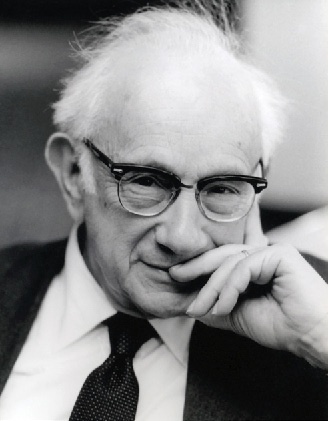Columbia College | Columbia University in the City of New York
Historian Fritz Stern ’46, GSAS’53: “An Eminence Far Beyond the World of Academia”
Fritz Stern ’46, GSAS’53, University Professor emeritus, provost emeritus and one of the world’s leading authorities on modern German history, died on May 18, 2016, in New York City. He was 90.
Throughout his career, Stern focused on what he called “the German drama,” the country’s descent from a locus of learning and culture into the destructive, brutal Nazi regime.
“I was born into a world on the cusp of avoidable disaster,” he wrote in Five Germanys I Have Known (2006). “And I came to realize that no country is immune to the temptations of pseudo-religious movements of repression such as those to which Germany succumbed.”
In their obituaries, The New York Times praised Stern for providing “a new understanding of the drift toward totalitarianism”; The Guardian (U.K.) said he had “gained an eminence far beyond the world of academia”; and Die Welt (Germany) described him as “a guardian angel of the new Germany.”
Stern was born on February 2, 1926, in Breslau, Silesia (present-day Wrocław, Poland). His father, Rudolf, was a physician; his mother, Käthe (née Brieger), had a doctorate in physics. He was named after his godfather, Nobel Prize-winning chemist Fritz Haber.

Stern’s grandparents had converted to Lutheranism but the Nazi regime classified the Stern family as Jewish, so they emigrated to New York City several weeks before Kristallnacht, the pogrom on November 9–10, 1938, when the Nazis murdered many German Jews and destroyed Jewish homes, schools, synagogues and businesses.
“It was only Nazi anti-Semitism that made me conscious of my Jewish heritage,” Stern told The New York Times in 2005.
Stern, who did not speak any English when he arrived in the United States, studied in public schools in Jackson Heights, Queens. He began at the College as a pre-med student but courses with Jacques Barzun ’27, GSAS’32 and Lionel Trilling ’25, GSAS’38 prompted him to consider history. Albert Einstein, a family friend, urged Stern to study medicine. “Medicine is a science, and history is not,” Einstein told him.
Stern studied history anyway, earning a B.A. (1946), an M.A. (1948) and a Ph.D. (1953), all from Columbia. He taught briefly at Cornell but returned to Columbia after completing his dissertation. He became a full professor in 1963 and University Professor in 1992.
Isser Woloch ’59, the Moore Collegiate Professor Emeritus of History, was Stern’s student before becoming a colleague. He not only remembers Stern’s “fine lecture course that I took as an undergrad” but also Stern’s first book, The Varieties of History: From Voltaire to the Present (1956), an anthology that Woloch says “influenced not only the public discourse on the political and moral history of modern Europe, as so much of Stern’s writing did, but the training of historians in the 1960s–80s.”
Stern reworked his dissertation into The Politics of Cultural Despair: A Study in the Rise of the Germanic Ideology (1961), a cultural and intellectual history that traced the origins of Germany’s receptiveness to National Socialism.
He returned to German politics in The Failure of Illiberalism: Essays on the Political Culture of Modern Germany (1972) and Dreams and Delusions: The Drama of German History (1987). But his most notable later work, arguably his masterpiece, was Gold and Iron: Bismarck, Bleichröder, and the Building of the German Empire (1977), a dual biography of Jewish German banker Gerson von Bleichröder and the “Iron Chancellor.” Gold and Iron earned Stern the College’s Lionel Trilling Book Award (1977) and a nomination for a National Book Award (1978).
Other works include Einstein’s German World (1999), the often-autobiographical Five Germanys I Have Known and No Ordinary Men: Dietrich Bonhoeffer and Hans von Dohnanyi, Resisters Against Hitler in Church and State (2013), which he co-authored with his wife, Elisabeth Sifton, a former senior editor at
Farrar Straus and Giroux.
Stern was widely regarded as the foremost American historian of Germany. He lectured regularly at the Free University of Berlin. In 1990, he participated in the “Chequers” seminar, where he was among those academics who tried to persuade Margaret Thatcher to support German reunification. In 1993, Stern moved briefly to Bonn to become a special senior adviser to Richard Holbrooke, the U.S. ambassador to Germany.
Despite this fame, Stern “certainly considered himself preeminently a Columbia person,” said Robert
Paxton, the Mellon Professor Emeritus of Social Sciences. He taught or supervised “an enormous load of students.” In 1962–63, Stern chaired an ad hoc committee that reviewed the Humanities core. Although he avoided becoming history department chair, he was provost 1982–83 and acting provost in 1987.
Stern’s first marriage, to Margaret Bassett, ended in divorce. In addition to Sifton, he is survived by the children of his first marriage, Frederick ’71 and Katherine; stepsons, Sam, Toby and John; three grandchildren; four step-grandchildren; and two great-grandchildren.
Timothy P. Cross GSAS’98, a former CCT associate editor, is a consultant and freelance writer based in Brooklyn, N.Y. He took two memorable courses with Stern in the mid-1980s.
Issue Contents
Published three times a year by Columbia College for alumni, students, faculty, parents and friends.
Columbia Alumni Center
622 W. 113th St., MC 4530, 6th Fl.
New York, NY 10025
212-851-7852
cct@columbia.edu
Columbia Alumni Center
622 W. 113th St., MC 4530, 4th Fl.
New York, NY 10025
212-851-7488
ccalumni@columbia.edu

